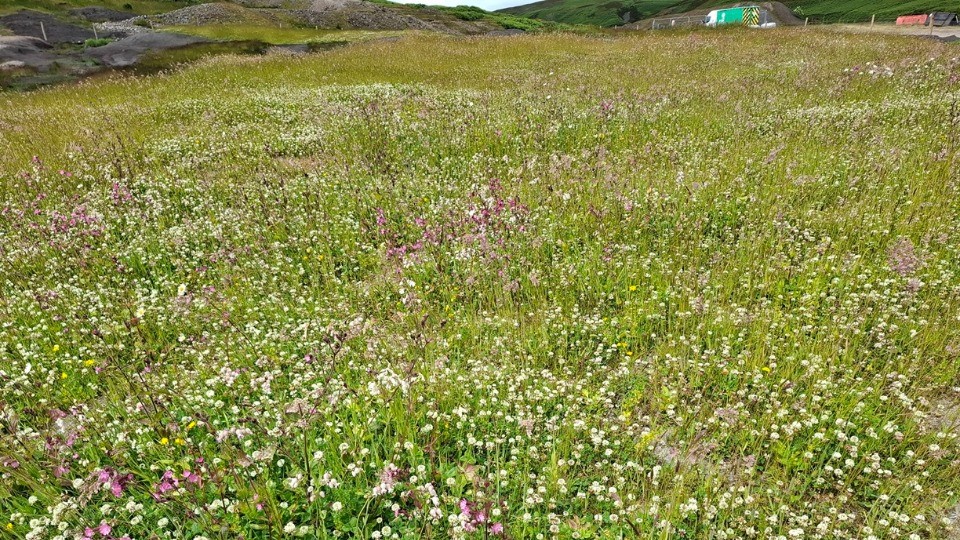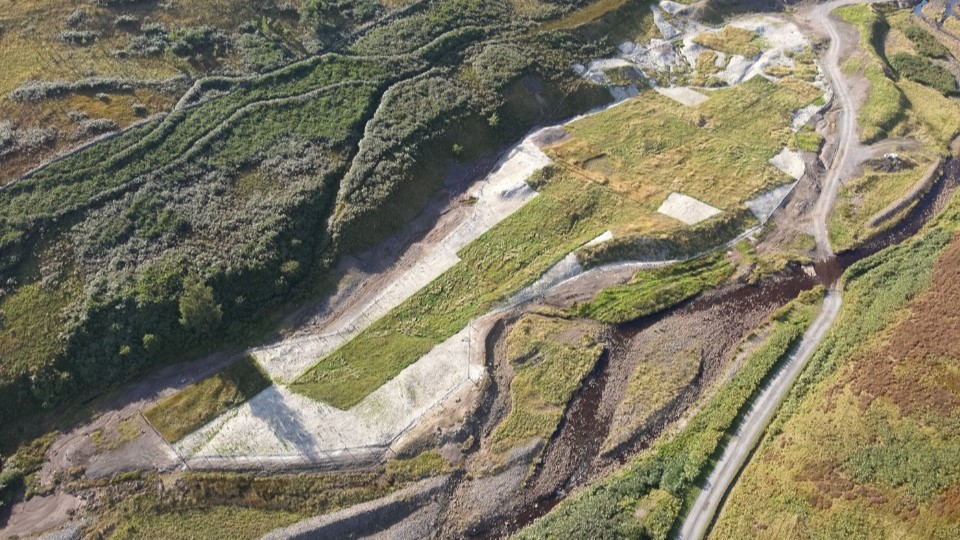The latest phase of an innovative £900,000 project to limit heavy metals polluting rivers in Upper Teesdale is complete.
The creation of over three hectares of vegetation plots above Middleton-in-Teesdale will limit heavy metals being washed out of abandoned mine sites next to Great Eggleshope Beck, Little Eggleshope Beck and Marl Beck, all tributaries of the River Tees.
By encouraging new plants to grow, less rain water will wash over or filter into the mine waste, reducing erosion and the amount of heavy metals washed into the becks.
The work was delivered as part of the North Pennines National Landscape, Tees-Swale: naturally connected programme, which aims to restore, expand and connect habitats and is funded primarily by National Lottery players through The National Lottery Heritage Fund.
This project to limit metals polluting rivers was led by the Yorkshire Dales Rivers Trust and the Water and Abandoned Metal Mines (WAMM) programme, working with the Tees Rivers Trust.
It is primarily funded by the Department for the Environment, Food and Rural Affairs (Defra) through the WAMM programme, a partnership with the Environment Agency and the Mining Remediation Authority.
Contaminated wastes pollute rivers
About 200km of rivers in Teesdale and Swaledale are polluted by metals released from long-abandoned metal mines. While metal mines played a major part in Britain’s history, water draining from abandoned mines, and the contaminated wastes left at the surface, continue to pollute our rivers and harm aquatic life.
This project, which started in June last year, was carried out following a successful trial at Great Eggleshope Beck in 2023.
An innovative hydroseeding technique, developed with Terraffix Soil Solutions, has been utilised to establish vegetation on the sites. This specialised, efficient technique uses seed and various mulch materials that are mixed with water and spread by hose – to create erosion resistant layers in which plants can grow.
Alongside the vegetation plots, a separate programme led by the North Pennines National Landscape team using plants grown from locally sourced seed will bring a boost to biodiversity by the creation of rare calaminarian grassland habitats – the unusual metal tolerant plants that can be found across the North Pennines.
Work will improve water quality and enhance biodiversity
Dr Hugh Potter, Environment Agency Water and Abandoned Metal Mines (WAMM) programme lead, said:
“We’re pleased the next phase of this innovative project has reached completion. It will limit the amount of heavy metals being washed out of mine wastes into rivers, improving water quality, as well as enhancing biodiversity.
“It’s been a combined effort, involving partners and landowners to bring these improvements to fruition and it will bring real long-term environmental benefits to the area.”
Other developments last year have included crucial work to reprofile mine wastes at the Marl Beck site as well as incorporation of drainage. This helped stabilise the landscape, reduce water flow across the site and created a more suitable environment for the vegetation establishment work.
At Little Eggleshope, work to stop erosion by reprofiling mine waste and stabilising the river banks with large stone was carried out in 2023 ready for the vegetation establishment work.
And in the future, tree planting will be carried out at various locations on the Marl Beck and Great Eggleshope sites to further stabilise the site and enhance the ecology.

‘Partnership is key’
Landowners have played a crucial role in the development and delivery of the project.
Tim Longstaff, Project Manager at the Yorkshire Dales Rivers Trust, said:
“This work to improve water quality and biodiversity is the result of a lot of effort by many people and organisations working together. Partnership is a key part of what we do as Rivers Trusts.
“I would like to particularly thank the landowners and tenant farmers, as well as the land agents and gamekeepers at Raby Estate and Neamour holdings. Their help and knowledge of the land has been invaluable.
“They also continue to help with the management and monitoring of the sites, helping ensure the project’s success.”
Mandie Kirk, Programme Lead at Mining Remediation Authority, added:
“The work undertaken across all three sites thoroughly demonstrates the Mining Remediation Authority’s commitment to water quality improvement and partnership working.
“Each site has represented an effective forward approach to ensuring biodiversity development across the Tees and Swale catchments through nature-focused methods.
“The effective partnership working between the Mining Remediation Authority, Environment Agency, Yorkshire Dales Rivers Trust and local landowners has been invaluable in bringing this project to completion.”
Landowners have played a key role
Mark Hutchinson, landowner and tenant farmer involved in the project, said:
“I have enjoyed working with the different organisations to bring about the project at Marl Beck, both on my land and the land I tenant. It is great to see the project making a positive difference to the land and to be able to help manage and maintain it.”
Joe Robinson, Raby Estate Land Agent added:
“We’ve already seen a significant improvement to land on the Raby Estate after taking part in this trial. From a landowner perspective, it’s turned ground that was devoid of life and activity into one that is now thriving and full of lush, green grasses which have grown in such a short project time frame.
“It’s also been wonderful to see the area frequented by bird and insect species as they forage for food. This trial has helped to demonstrate that these waste areas can play a positive role in nature once again and we’d welcome the opportunity to take part in schemes such as this in the future.”
The work completed here will improve the water quality in the Tees catchment and support meeting the government’s Environment Act target to halve the length of rivers polluted by harmful metals from abandoned metal mines by 2038 and improve the water quality in the Tees catchment.



